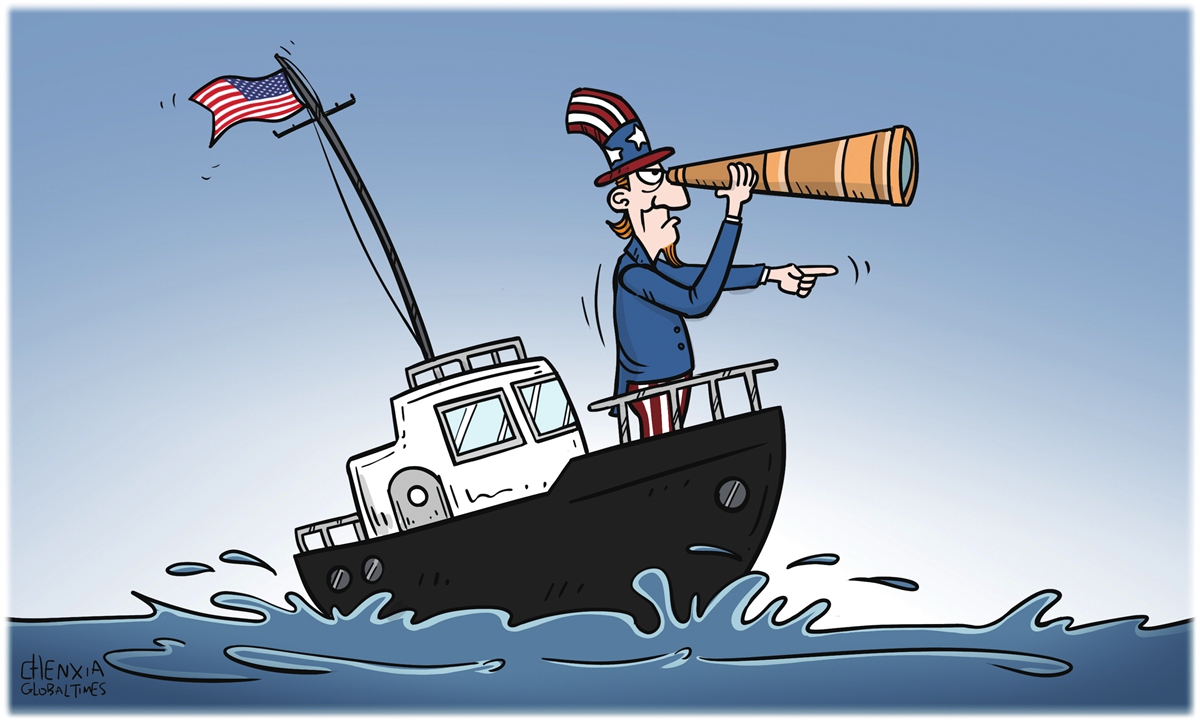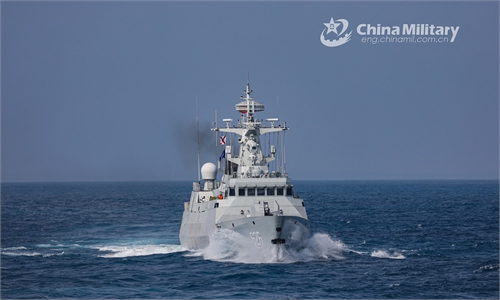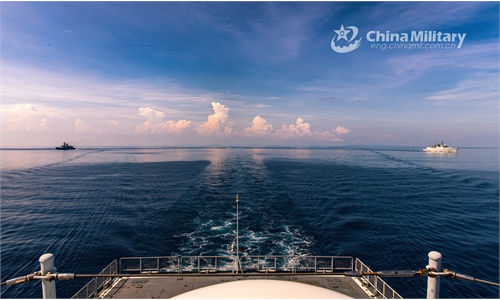Hyping of invalid S.China Sea arbitration stirs up trouble in the region, invokes Cold War mentality

Illustration: Chen Xia/GT
It has been many years since the South China Sea arbitration, which caused huge disturbance and serious damage to the peace and stability in the South China Sea and the healthy development of China-Philippines relations. However, some countries inside and outside the region still hype the arbitration's ruling, attempting to deny China's legitimate rights and claims in the region, and serving the purpose of consolidating their illegal gains or countering China by meddling in South China Sea affairs.It is unquestionable that China's territorial sovereignty over the South China Sea islands has sufficient historical and legal basis. After the end of WWII, the South China Sea islands returned to China, which constitutes an important part of the post-war international order.
The South China Sea arbitration, unilaterally initiated by the Philippines' Aquino administration, was a wrong choice. With the instigation and support of the US and under the premise of the so-called legalization of their illegal occupation of the Nansha Islands, the Aquino administration made juridical provocations against China to consolidate its illegal gains and harm China's sovereignty and maritime rights.
In this case, the arbitral tribunal violated many basic principles that international judicial and arbitration institutions should abide by, exercised jurisdiction beyond its power and made a ruling with a predetermined conclusion and many loopholes. In recent years, some countries inside and outside the region have been hyping the so-called binding force and validity of the arbitration, which makes people question: Is forcibly bringing relevant disputes into the framework of legal settlement, regardless of realistic conditions, suitable for the complicated South China Sea dispute? Has the third-party compulsory settlement procedure without the country's consent deviated from the original intention of the dispute-settling mechanism under the United Nations Convention on the Law of the Sea (UNCLOS)?
The core of the South China Sea issue is a dispute over territorial sovereignty and maritime demarcation. The arbitration cannot, and in fact has not provided any fair solution to the dispute. On the contrary, it makes the already complicated South China Sea issue more difficult to resolve. It has not only failed to play a positive role in the interpretation of the rules of international law, but also undermined the balance and impartiality of the UNCLOS as a package deal. It failed to enhance the reputation and credibility of international judicial and arbitration institutions, and even harmed the state parties' confidence in the correct use of the UNCLOS.
At present, the international situation is increasingly characterized by instability, uncertainty and insecurity, with a return of Cold War mentality and an undercurrent in the South China Sea. The outside world should more deeply understand China's mind-set and approaches in dealing with sensitive issues such as territorial sovereignty and maritime jurisdiction disputes. To specify, they should view relevant affairs in the context of China's national development strategy, its overall diplomatic goals and guidelines, its perception of its security environment and its interaction with the outside world. The outside world should not merely observe China's policies and actions in the South China Sea, nor should they be paranoid about a third-party compulsory dispute settlement mechanism that is only a specific part of the UNCLOS.
Countries involved in the South China Sea dispute, which try to impose their unilateral claims on China through the international justice and arbitration, will not succeed, but will be exploited by extraterritorial forces with ulterior motives to stir up the troubles in the South China Sea and to disrupt relations between China and ASEAN countries.
The US has recently proposed to reshape the strategic environment around China with the "invest, align, compete" approach, and the old thinking and practices of international politics, such as bloc confrontation and zero-sum games, still have an impact on maritime issues around China's peripheries. The US always refers to a "rules-based order" in the South China Sea, however, the "rules" in US narrative are not based on the basic doctrine of the international law, and are not rooted in the equality of all countries and the democratization of international relations. It goes hand in hand with the logic of power politics and alliances. This has transformed the "rules," which should be neutral, objective and universally applicable, into institutional hegemony, and the US-led alliance has given the nature of their suppression against the opposition a cover called "collective will."
The South China Sea issue has both political and legal attributes, and various factors are intertwined. In the process of exploring a solution, the countries concerned should move away from the myths and paranoia about the "validity" of the arbitration award, work with China to maintain the hard-won peace and stability in this region, and seek a sound and long-term solution to this issue.
The author is deputy director of the Research Center for Oceans Law and Policy at China's National Institute for South China Sea Studies. opinion@globaltimes.com.cn



